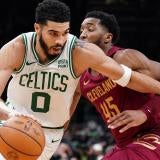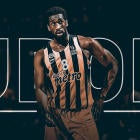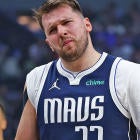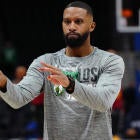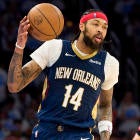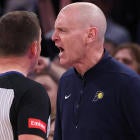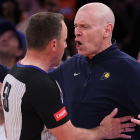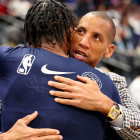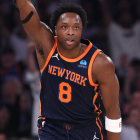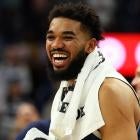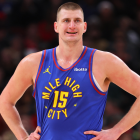Ekpe Udoh never thought he'd end up in Istanbul. After leading the Baylor Bears to the Elite Eight in 2010 and showing promise with the Golden State Warriors, his NBA prospects fizzled and he found himself playing for Fenerbahce in 2015. The shock of his situation took a while to wear off.
"At first it was tough, it was different, I was away from home," Udoh said. "I was the sixth pick [in the 2010 NBA Draft], and now I'm overseas."
Udoh spent a significant portion of his first season abroad watching movies with a high school teammate who accompanied him. After a few months, though, that got old, and he decided to put himself out there. He visited schools, did meet-and-greets with fans and became something of a cult hero. "Once I saw how beautiful it was," Udoh said, Turkey changed his life.
When Udoh left after two seasons, he was a champion and the MVP of the EuroLeague Final Four. Before his arrival, Fenerbahce had never won the EuroLeague. Upon reaching an agreement to sign with the Utah Jazz last summer, he wrote on his website that "Fenerbahce and Turkey rekindled my love for basketball." He also promised to return after every NBA season.
"They really love their sports, their athletes or anybody who brings eyes to their culture," Udoh said. "Some people don't feel like they were heard as often. I was able to do that, man. I just thought, that's where I was gonna be. And I just tried to throw myself into everything."
Udoh said this in an Uber on his way from the Jazz's practice at the New York Athletic Club in Manhattan to Mott Hall Bridges Academy in Brownsville, Brooklyn. This particular visit was special -- Udoh had heard about the school and its principal, Nadia Lopez, after a viral Humans of New York post led to a TED Talk and a PBS feature. He got in touch with Lopez through a friend, donated books to the school and, eventually, there he was, hugging English teachers.
"He came here by himself without an entourage," Lopez said. "He's walking down the hallway, trying to figure out where he's at. He's engaging folks; he's going into classes, talking to people."
Udoh was only supposed to stop by briefly, but wound up staying for four hours. He chatted with Lopez in her office, answered students' questions and watched basketball practice. He told the players that their coaches are only hard on them because they want them to flourish.
There was no press about this, unless you count Udoh's and Lopez's Instagram accounts, and that is his style. Wherever he goes, Udoh quietly adds value. While his impact is obvious to those around him, you can miss it entirely if you are not looking for it.

Scott Drew had yet to win an NCAA Tournament game before Udoh stepped on Baylor's campus as a Michigan transfer. Udoh only finished third on the 2009-10 team in scoring but was unquestionably its most important player. Drew described him as the type of guy who did all the unglamorous things that contribute to winning and "the best help-side defender I've ever coached."
Drew recalled how Udoh would perfectly fake early help against a good scorer so that the ball would never even go his way. How the guards could extend their defense with Udoh behind them. How he finished second on the team in assists, functioning as a sort of point-center. Drew said Udoh didn't have a "scoring ego."
Golden State drafted Udoh in between DeMarcus Cousins and Greg Monroe, two highly skilled post players. While he had solid footwork and a developing face-up game, his best attributes could not have been more different than theirs. Almost immediately, Udoh was one of the league's best rim protectors. He yelled out coverages on defense like a veteran, set solid screens and made life easier for their backcourt of Stephen Curry and Monta Ellis.
Seven seasons ago, the NBA's transition to a pace-and-space league was still in its early stages. The up-and-coming Oklahoma City Thunder traded for Kendrick Perkins and then gave him a contract extension. The Eastern Conference champion Miami Heat started Zydrunas Ilgauskas and Erick Dampier at center during the regular season. Udoh did not have the size of those traditional bigs, but he had speed, athleticism and basketball IQ. Hard-core Warriors fans wanted him to play more because of his team-best plus-minus.
"Shoutout my guy Ethan Strauss. He used to hold me down on the plus-minus front," Udoh said, referencing the former ESPN writer who pointed out his strengths early for WarriorsWorld. "I don't know what it was. I guess defensively I would come in and give a boost. I was coming in with the second unit, so then we would get stops and convert on the other end. We just kept it going."
No one in Golden State wanted to turn him into a high-volume scorer. He fit the way the team played and the way the league was headed. Then-Warriors coach Keith Smart, who was fired after Udoh's first season and is now an assistant coach for the Memphis Grizzlies, said he wishes he could have kept working with him.

Udoh played well enough in Golden State to earn a starting spot three months into his second season. Just as he got comfortable with his role, though, he was traded. The Warriors sent him to the Milwaukee Bucks with Ellis in exchange for Andrew Bogut, a center who checked many of the same boxes as Udoh but had more experience and more size.
"It was out of nowhere," Udoh said. "I was starting to play well. I know we had just won a big game against the Clippers and we were in Sacramento. And during my pregame warmup, I noticed there's a lot of media around the court. I was like dang, somebody must have gotten traded. I get to the locker room and I see the trade. That hurt."
Udoh struggled to adjust in Milwaukee. He bulked up, and that took away some of his quickness and explosiveness. He suffered a knee injury before the the 2013-14 season, then missed more games with ankle issues. The basketball IQ was still there, but Udoh wasn't himself.
"Just lost my way, I guess," Udoh said. "Lost my confidence. That was tough. But it's part of the game."
Udoh signed a minimum contract with the Los Angeles Clippers in 2014 but spent the season warming the bench. Fenerbahce then came knocking, offering what he called a "reset."
"I didn't have any pressure," Udoh said. "Just a clean slate."
In the international game, Udoh was a menace on defense. This was partially because he could hang back in the paint like he did in college and partially because he slimmed down. "I lost 20 pounds in a couple of weeks and that was my weight," Udoh said. In a film session, he said the team should stop sending double-teams when he switched onto small guards. This allowed Fenerbahce to play like a versatile, modern NBA team.
Sacramento Kings guard Bogdan Bogdanovic, Fenerbahce's leading scorer in both of Udoh's seasons, said it was unbelievable to play with him. "He was the most important player on our team, for sure," Bogdanovic said, adding that Udoh is an amazing guy and fans loved him.
Udoh set the single-season EuroLeague record for blocks in his first year. He broke that record in his second. Legendary coach Zeljko Obradovic's offense helped him rediscover himself as a passer and a scorer. More than one Warriors blog argued they should bring him back.
"His game, really, it wasn't fair overseas," Brooklyn Nets forward and former Baylor teammate Quincy Acy said. "He was a monster."
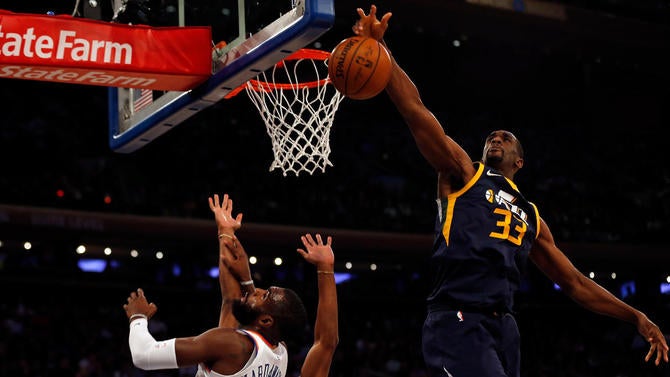
Udoh FaceTimed with Acy "at least two or three times a month" when he was in Turkey, Acy said. Both have had their share of ups and downs as professionals.
"I had got cut and I was in the D-League and we still stayed in touch and we were still able to learn from each other," Acy said. "I could give him advice, he could give me advice."
When Udoh signed with the Jazz, Acy could not have been happier. In his first stint in the league, "they tried to put weight on him and kind of turn him into this Kendrick Perkins big shot-blocker type deal, and he had so much more to offer," Acy said. Now that plodders are almost extinct, Udoh could come back and show that he was before his time.
"You can't ask for a better situation for a guy with his skill set," Acy said. "It's heartwarming because you know what he's been through and you know what type of guy he is. I think the stars aligned for him."
Utah coach Quin Snyder himself had a European sojourn, coaching under the renowned Ettore Messina at CSKA Moscow in 2012-13. Snyder's system would look at home in the EuroLeague -- it is not fast-paced, but it is pass-heavy and reliant on timing, teamwork and using angles to create advantages. Snyder and Udoh talked a bit about their experiences before Udoh signed, and Udoh said that it "all matched up at the perfect time."
Acy still pushes Udoh, telling him to be more aggressive and selfish on offense, even if he's more comfortable focusing on defense and making his teammates happy. Udoh does not even argue, saying that he sees the same thing on film and must look in the mirror and face it.
"I just want to win," Udoh said. "Obviously I gotta do more. I'm not giving us enough to win. Defensively you know what you're going to get: I'm going to be solid, I'm going to block shots. That's what it is. Offensively, I gotta be able to provide something. Period."
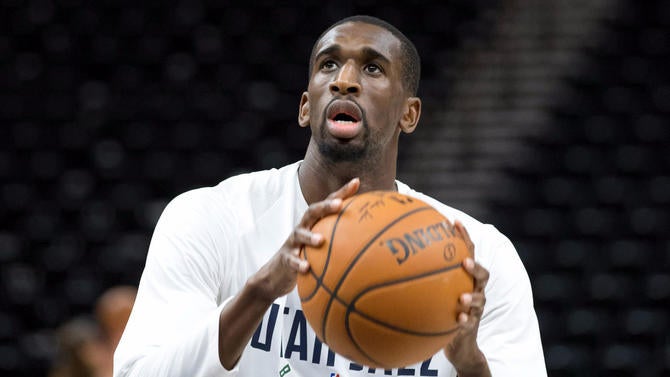
It should be noted that, when Udoh said this, the Jazz had lost six of seven games. Before losing a nailbiter in Oklahoma City on Tuesday, they had won seven of eight, including four massive blowouts. That was their best stretch of the season, despite star center Rudy Gobert missing all of it aside from Monday's 47-point win over the Wizards with a knee injury.
Gobert's absence meant that Udoh's minutes were essential, but he still did his work off the bench and without much fanfare, save for a Deadspin story that praised the way he always knows where to be. Just like at the beginning of his career, Udoh is a plus-minus superstar -- Utah has outscored opponents by 9.6 points per 100 possessions with him on the court.
"The guy has helped us incredibly in this early season," Jazz forward Thabo Sefolosha said. "What he's capable of doing, personally, it impresses me. He's not a super athlete, but at the same time he goes and blocks shots and does all the small things that don't necessarily show up on the stat sheet. Very, very valuable."
On his way to Mott Hall Bridges, Udoh made it clear that he doesn't look back at any of his prior stops with bitterness. Golden State gave him his start. Milwaukee was where, with the help of Bucks public relations director Dan Smyczek, he started his popular, long-running book club. He has maintained relationships with people from his Clippers days, even though he didn't make many basketball memories with them.
Anytime Udoh leaves a city, he wants to be known for more than what he did on the court. For someone so easygoing, he sounded almost fervent when talking about how people need to "sit down, get off the computer or whatever you're on, social media, and just read a book." As Lopez, the principal, explained that she and Udoh hope to start a program at Mott Hall together, it becomes clear that the qualities that make Udoh a helpful role player are the same ones that draw people to him.
"He just wants to make everyone happy," Acy said. "And that's just genuine. That's just him."









